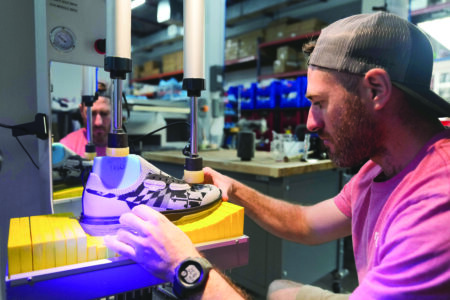State pushes to expand free pre-K programs

(Photo courtesy of Pexels - Pavel Danilyuk)
LANSING — Gov. Gretchen Whitmer is pursuing the goal of extending free pre-K to more Michigan families by 2027.
Her plan would make families with incomes up to 400% of the federal poverty level eligible for the program.
The expansion would come with a $254.6 million increase in state funding, according to the Department of Lifelong Education, Advancement and Potentials’ Pre-K for All implementation brief.
If the income eligibility cap is removed, all families in the state would become eligible to enroll in Pre-K for All by fall 2024, according to the brief.
Rep. John Fitzgerald, D-Wyoming, who supports the initiative, said Michigan’s budget “should be a reflection of the priority of Michiganders.”
The state is “making sure that we have the ample workforce, space and resources necessary to make sure that these youngest students would have the support that they need,” said Fitzgerald.
“We want to prioritize life-long learning,” he said.
Now around 49,000 4-year-olds are enrolled in the state’s publicly funded learning settings.
The state would need to enroll an additional 32,000 children to meet its goal of 75% of eligible children participating..
That would require at least 1,700 more lead teachers, 3,400 more associate teachers and 1,700 more classroom spaces, according to the department’s implementation brief.
Whitmer called for the expansion in her State of the State address earlier this year.
Emily Laidlaw, the deputy director of the Office of Early Education at Lifelong Education, Advancement and Potential, said the state is using its Great Start Readiness Program as a path toward Pre-K for All.
The program is recognized as one of the top pre-K programs in the country, she said. It offers many 4-year-olds a safe place to learn, make friends and engage in hands-on activities, according to the department’s website.
Elizabeth Grace, the director of early childhood at the Wayne Regional Education Service Agency, said that the Great Start program “is a choice for families, and Pre-K for All will remain a choice for families,” said Grace.
Now Great Start has seven eligibility factors, she said.
They are low family income, diagnosed disability or identified developmental delay, severe or challenging behavior, a primary home language other than English, parents with low educational attainment, abuse or neglect of the child or the parent, and environmental risk.
“Most of the slots fill with the eligibility factors,” said Grace.
My understanding of the long-term vision of Pre-K for All is the income cap would be lifted,” she said.
The income cap is set to be potentially raised for the 2024-25 school year, but not completely eliminated, according to Grace.
Laidlaw, from the Lifelong Education Department, said the benefits of free pre-K to families are “remarkable,” she said. “We know that pre-K sets kids up for success.”
Children who complete pre-K are more likely to enter kindergarten ready to succeed and are more likely to graduate, get a higher education and land a good-paying job, according to Laidlaw.
Along with academic benefits, “this is something that will help Michigan families save money,” said Fitzgerald.
Pre-K can cost families around $10,000-$15,000 per year per child, “which is out of reach for many families and is why this is so important,” said Laidlaw.
Fitzgerald has a child younger than two at home who goes to day care five days a week.
“That cost is our second-largest line item in our household budget behind our mortgage,” said Fitzgerald.
“This is something where Michigan families are having to decide if they can afford to both work and raise a young family,” he said.
Pre-K for All would aid families’ budgets, encourage workforce participation and support a child’s learning, according to Fitzgerald.
The implementation of Pre-K for All would significantly add to the state budget, he acknowledged.





